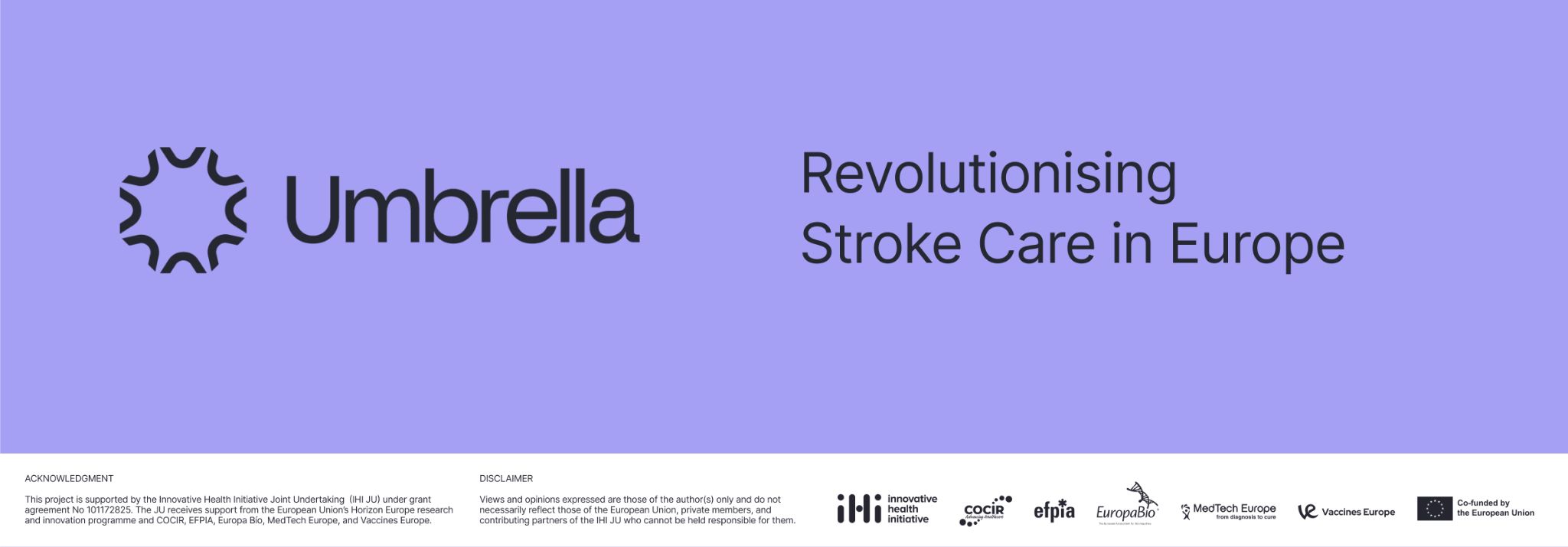AI based solutions and advanced digital technologies to revolutionise stroke care in Europe
UMBRELLA, a consortium of over 20 public and private partners co-led by BHH members Vall d’Hebron Research Institute (VHIR) and Siemens Healthineers, kicks off with the aim of revolutionising the entire stroke care pathway in Europe by adopting a holistic approach that covers stroke diagnosis, prevention and care.
Over 1 million individuals in Europe suffer a stroke every year. In addition, nearly 10 million people are living with the long-term impacts of stroke, making it a leading cause of disability in adults in Europe and resulting in approximately 460.000 related deaths annually, according to a recent study. Subsequently, the economic toll is substantial, with stroke care costs estimated to be around €60 billion in 2017 across EU countries. Stroke incidence is only expected to rise due to an ageing population and an increasing exposure to risk factors such as obesity or diabetes, straining healthcare systems even further.
To revert this scenario, the Innovative Health Initiative, a partnership between the European Union’s Horizon Europe research and innovation programme and the industry associations COCIR, EFPIA, Europa Bío, MedTech Europe, and Vaccines Europe, will fund the UMBRELLA project alongside industry partners with close to 27 million euros over the next five years. UMBRELLA is set to open a new era in stroke management by implementing a comprehensive approach that addresses gaps along the whole stroke care pathway, from diagnosis and emergency treatment, right through to rehabilitation and prevention of recurrent strokes. “UMBRELLA represents a stroke care revolution that will accelerate the access to cutting edge innovative and personalised diagnoses and treatments to thousands of stroke patients in Europe” indicates Dr Carlos Molina, Head of the Stroke Research group at Vall d’Hebron Research Institute (VHIR) and scientific coordinator of this project.
In addition, the project will harness the potential of artificial intelligence (AI) and cutting-edge digital technologies to transform stroke diagnosis, reduce time to treatment and improve long-term clinical outcomes. It will also further the understanding of stroke and its underlying causes to advance prevention strategies. "We feel honoured to co-lead UMBRELLA which unites leading academia and industry for the benefit of thousands of stroke patients in Europe," states Frank Berger, Global Head of Acute Stroke Treatment at Siemens Healthineers.
Saving time to save lives and prevent irreversible brain damage
A stroke occurs when blood flow to the brain is blocked by a clot (ischemic) or a burst blood vessel (haemorrhagic). Once symptoms occur, early diagnosis is crucial to prevent irreversible brain damage and to ultimately save lives. This can include diagnostic capabilities in the ambulance for a fast and effective triage to the right hospital and swift administration of appropriate treatment.
Competent decision-making and seamless coordination among multiple healthcare professionals ranging from stroke origin identification, prevention of recurring strokes or long-term rehabilitation, are key but often constrained.
UMBRELLA is set to standardise, harmonise and integrate real world stroke data, including protocols, programs and other relevant information, leveraging state-of-the-art digital technologies such as seamless communication systems, innovative imaging techniques, use of wearable devices or home based virtual rehabilitation means. Collected data will serve as a basis for the creation and validation of AI-based predictive models, e.g. for improved diagnosis, risk assessment, treatment selection, and patient outcomes. “We support the consortium's unique approach to utilise innovative technology validated by real world data for faster and more effective treatment of acute strokes as well as better understand stroke causes and prevent recurrence," explains Hanno Herrmann, Global Head of Secondary Stroke Prevention at Siemens Healthineers.
Harnessing the power of AI
One of the project goals is to build a federated data platform (U-platform), which will serve as a foundation for creating and validating AI algorithms based on collected retrospective data across the consortium, allowing for advanced personalised diagnosis, risk prediction and treatment decisions for stroke patients.
The algorithms generated in the U-Platform will then be utilised and trained through a federated learning infrastructure (FL-platform). This model obliterates the need for patient data to be shared across centres, preserving data security and privacy while fostering collective AI-model training, which numerous stroke patients across Europe can benefit from.
UMBRELLA will also create and implement standardised stroke management protocols and procedures in acute settings across the participating centres with a vision of adopting them into official European guidelines. These new consolidated protocols can facilitate data collection, monitoring, outcomes prediction or medical decision-making and offer an opportunity to improve care for stroke patients living in remote or underserved areas.
Understanding the unknown
Another goal of UMBRELLA is to better understand causes for the 25% of stroke cases lacking clear aetiologies: While around 50% of ischemic strokes are caused by (large artery) atherosclerosis or cardioembolic sources, the source of every fourth stroke remains unknown. New diagnostic technologies and refined workflows allow to improve understanding of the underlying disease and identify the root cause of the stroke. This means that in future, more patients could receive preventative treatment earlier and thus prevent more strokes from re-occurring.
In addition, UMBRELLA will investigate the influence of, e.g. patient demographics or co-morbidities on treatment outcome of intracranial haemorrhages, another devastating type of stroke.
A public-private alliance to ensure solutions reach stroke patients
Under the leadership of Vall d’Hebron Research Institute (VHIR) from the clinical side and Siemens Healthineers as the industrial co-lead, the partnering organisations will work hand in hand to ensure better health outcomes for stroke patients. “UMBRELLA will set new standards of cross-sector collaboration that will positively impact quality of life and reduce disability of stroke patients in Europe” declares Dr Carlos Molina. The project brings together a consortium consisting of 7 top-tier hospitals in Spain, Italy, Belgium, Switzerland, Germany and the Netherlands, European Research Infrastructures and over 20 private organisations, from small startups to large multi-national corporations.


